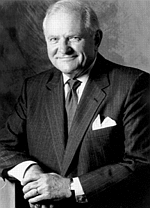Donald W. Banner
For his application of electrical engineering to intellectual property law and for his service as United States Commissioner of Patents and Trademarks, the Schools of Engineering are proud to present the Distinguished Engineering Alumnus Award to Donald W. Banner.
Shareholder and Co-chairman
Banner & Witcoff Ltd.
BSEE 1948

On choosing to study electrical engineering at Purdue
At the age of 19, I was a fighter pilot in World War II. Toward the end of that conflict, I was missing in action and a prisoner of war. One of the things I learned from that experience was that I wanted to know more about technology and how it operated to strengthen our nation. I had a brother-in-law who'd gone to Purdue, and electrical engineering was something that I had always been interested in-radio, TV, and navigational systems. So I pursued my education at Purdue.
On World War II's effect on him as a student
I went to Purdue on the G.I. Bill. I was a disciplined student, and I think the veterans coming back were much more dedicated and serious than the younger people. Overriding my experience at Purdue was the fact that, once you've been in a war, you have a patriotic feeling and an interest in the expansion of the country's position in the world and in the strength of its economy.
One thing that motivated me, therefore, was the personal experiences growing out of that war. In writing about the Civil War, Oliver Wendell Holmes, who had participated in it, said, "In our youth our hearts were touched with fire." I agree that many of us who later were faced with the threat to our country felt the same way.
On becoming a patent attorney
When I came to Purdue I was strictly interested in engineering. Near the end of my career at Purdue there was a Veterans Administration program on campus that offered the kind of counseling that tells you what you're best qualified to do in life. I went through that program, which was free to veterans. At its conclusion the counselor told me, "Mr. Banner, you ought to be a patent lawyer!" I had never heard of patent lawyers, but Dean Potter, who was the dean emeritus of the Schools of Engineering and a good friend, encouraged me to look into this "patent lawyer" prospect. I went down to the student union employment office, and lo and behold, there was a job listing for a patent lawyer. That's how I got my start.
On issues in intellectual property law
There's a constant struggle to be sure that everybody, including people who don't have a lot of money, can patent their inventions. Some international organizations and corporations have tried to make it difficult or impossible for individual inventors and small businesses to play a role, and that concerns me. The history of our nation indicates clearly that we've become rich and strong because we've encouraged the dedication and work of individuals and small companies. We've protected patent rights as far back as the Constitution, and our country has progressed because of it. As Abraham Lincoln-himself a patentee-put it, that protection "added the fuel of interest to the fire of genius."
Another issue in intellectual property law is the creation of the Internet. The law hasn't caught up with the technology yet, and there are many trademark and copyright issues that must be confronted. There will be conflicting interests and difficult things to resolve. We don't have any experience with something precisely like this, a new medium that can transmit data instantly around the world.
On education
It is absolutely essential that we have a thorough, widespread, vigorous educational activity in our country. It is necessary to provide jobs for our people and ensure strengths to our arms. Our institution, Purdue, has a unique opportunity and an obvious duty to carry forward its standard of excellence in this regard
- 1996-present:
- Partner, Banner & Witcoff Ltd. The firm has approximately 70 attorneys, including eight with PhDs in engineering and science, and specializes in patent, trademark, and copyright law.
- 1994:
- Named a Purdue Outstanding Electrical Engineer.
- 1990:
- Professor and Head of the Intellectual Property Dept. at the National Law Center, George Washington University.
- 1984:
- Received the Jefferson Medal for outstanding contributions to patent, trademark, and copyright law.
- 1982:
- Received the Pacific Industrial Property Association's first award to an American for outstanding contributions to international cooperation in the intellectual property field.
- 1982:
- Wrote "patents" section for McGraw-Hill's Encyclopedia of Science and Technology.
- 1980:
- Partner, Banner, Birch, McKie & Beckett. The firm merged with Allegretti & Witcoff in April 1995.
- 1979-1988:
- Distinguished Professor of Law, The John Marshall Law School. Also served as director of the graduate school program in intellectual property law and as director of The John Marshall Center for Intellectual Property Law.
- 1978-1979:
- U.S. Commissioner of Patents and Trademarks.
- 19771978:
- President, American Intellectual Property Law Association.
- 1972-1973:
- Chairman, American Bar Association's Patent, Trademark, and Copyright Law section.
- 1970:
- Named a Distinguished Alumnus by The John Marshall Law School.
- 1963-1978:
- General Patent Counsel, Borg-Warner Corp.
- 1959-1978:
- Adjunct Professor of Law, The John Marshall Law School.
- 1963:
- Admitted to practice before the Supreme Court.
- 1952:
- Patent Attorney, Square D Co.
- 1943-1946:
- Decorated.
BSEE 1948, Purdue; Juris Doctor 1952, U. of Detroit; Master of Patent Law 1958, Doctor of Laws 1979, The John Marshall Law School
